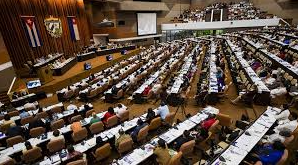
Human rights organisations argue that the revised law strengthens state power and further suppresses opposition.
Cuba’s newly approved penal code has sparked concerns from human rights organisations, with critics arguing that the legislation further curtails freedom of expression and political dissent. While officials claim the updated laws are intended to modernise Cuba’s legal framework, the amendments are viewed by many as a way to intensify the control over opposition voices.
The law, passed by Cuba’s parliament on Sunday, imposes strict regulations on unauthorized communications with foreign individuals and entities, as well as prohibiting foreign funding. It introduces harsher penalties, including prison terms of up to 30 years and, in extreme cases, the death penalty for individuals who share information with international organisations or unauthorised foreign entities.
Supreme Court President Rubén Remigio Ferro hailed the law as “modern” and “inclusive,” stating on state television that the code prioritises “prevention and education before repression” while ensuring “sufficient rigor” in punishing crimes that threaten “social peace and national stability.” The law will come into effect once it is reviewed by a drafting commission and published in the official gazette.
Despite claims of reform, critics argue the law reinforces Cuba’s longstanding approach to silencing dissent. The country’s history of repressing opposition is evident, as seen in the aftermath of the July 2021 protests, during which hundreds of individuals were arrested, and some were sentenced to long prison terms on charges such as sedition. Independent journalists in Cuba have also faced persecution, often leading to their imprisonment or forced exile.
The new law eliminates the vague charge of “precriminal dangerousness,” which has historically been used to target dissidents, but it introduces new categories of offences. For instance, those who insult or attack public officials, or civilians fulfilling their “citizens’ duty,” face imprisonment for up to five years. A similar penalty applies to individuals who incite opposition to Cuba’s socialist order, with a heavier sentence of up to 10 years for those who use mass media to do so.
One of the most controversial provisions is the ban on any form of unauthorized funding from international or domestic sources that is linked to criminal activity. While this does not apply to remittances from Cubans living abroad, it has been seen as an additional tool for the government to monitor and control foreign financial influence.
Ana Cristina Núñez, senior researcher for the Committee to Protect Journalists, condemned the law as an “intricate and perverse legal regime of censorship,” highlighting its devastating impact on independent media. The code also reinforces penalties for corruption, speculation, and hoarding, and adds harsher punishments for crimes involving gender violence or harm to minors and people with disabilities.
Despite some criticism, the law retains the death penalty for 23 crimes, a provision that has not been used since 2003. The age of criminal responsibility remains at 16.
Saily González, an activist who monitored the 2021 protests, expressed concern that the new code offers the government an even more direct means of suppressing civil society and political opposition. Some lawmakers rejected a proposal by Mariela Castro, the daughter of former President Raúl Castro, to explicitly criminalise femicide, arguing that the enhanced penalties for gender violence were sufficient.












